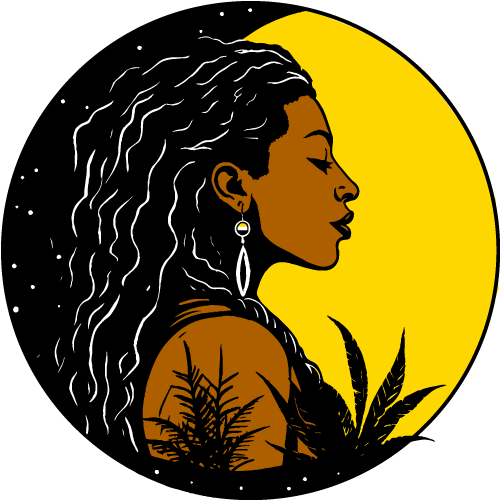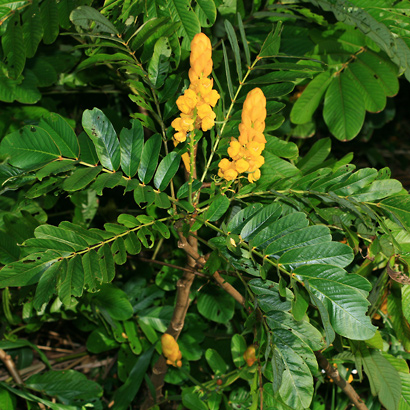Pissabed (Senna Alata) is a large ever green leaf senna plant known also as candle bush, senna, candle stick, and ringworm bush. It is a beautiful wild flowering bush with a generous bright yellow bloom. This Belize rain forest native grows up to 10 feet tall in height, and is loved by bees, butterflies, birds, and native healers.
Everybody in Belize knows of Pissabed use in purge and piss, but we have paid little homage to the other healing marvels this aptly named plant is capable of. I first became interested in the Pissabed when my uncle gave an account of having used the juice and pulp of this plant to heal a skin discoloration disorder that affected his legs. The Pissabed leaf juice treatment completely cleared the condition and it has never returned. Science finally lent credence to my uncles healing when, in 1994, after a ten year human study in India; research found Pissabed leaf juice indeed to be a reliable herbal treatment for skin discoloration. Findings revealed that Pissabed leaf juice kills the fungus that prevents skin cells from producing color.
The Garifuna name for Pissabed is Ganibisi, and every Garifuna community has a revered Ganibisi bush somewhere in their lot. Medicinal tradition prescribes Ganibisi leaf tea for intestinal purging, blood cleansing, and for lowering blood sugar. The tea is also used to improve digestion, and can be doubled in strength to reduce excess water in the body, alleviate swelling, and relieve pain. Pissabed is recognized by science to contain a group of chemicals that are known laxatives. In 2003 scientist produced evidence that Pissabed leaves are not only anti-inflammatory, but also have pain relieving, and hypoglycemic (lowering blood sugar) properties.
More recent studies revealed that Pissabed leaves also contain a chemical with the ability to reduce sticky blood and dissolve arterial plaque (as in cholesterol). It is treasured by Farmers who save on veterinary expenses by using the leaf pulp on their animals to treat skin afflictions like mange, fungus, removing ticks, mites, and other external parasites. As a topical treatment, it works for those who use it. Healers and non-healers alike can mash the leaves of this plant into an all-purpose skin salve and use it to treat insect bites, ringworm, syphilis sores, herpes ulcers, scabies, shingles, eczema, skin sores, ripen boils, even out skin tone/color, to relieve itching, and any type of rash.
Although this plant is an intelligent healer by design, it is not advisable to try internal Pissabed treatment without consulting a qualified herbalist. Drinking Pissabed tea increases urination and, (hence the name) will make you piss any bed. It will also make you sweat. It is an excellent herbal remedy for detoxification, as it helps clean, strengthen, and tone, the organs of both the urinary and digestive system. It is used by healers to treat incontinence and prevent bed wetting. Pissabed is not taken for more than seven consecutive days. And it is NOT to be taken along with any diuretic medication or pharmaceuticals.
Pissabed is an easy to propagate low maintenance plant. It grows from seeds, root balls, and cuttings. Allow for the pods to dry on the plants and break them open to collect the seeds. The seeds last a long time, can be stored, and can keep for up to a year. Once planted, it will self-sow freely as long as it has full sun. It begins flowering from 4 feet and continues to do so every year. Pissabed makes a gorgeous addition to any garden.





